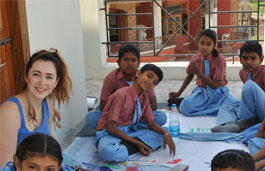Search
English and Creative Writing BA (Hons)
Study level: Undergraduate
Passion for language, literature and creative writing can lead to exciting careers in publishing, advertising, teaching, journalism and more.
Course features
Year of entry
Location
Coventry University (Coventry)
Study mode
Full-time
Part-time
Sandwich
Duration
3 years full-time
4 years sandwich
Flexible part-time
Course code
QW38
Start date
September 2025
The information on this page is for 2024-25 entry and should be used as guidance for 2025-26 entry. Please keep checking back on this course page to see our latest updates.
Course overview
This course is ideal if you want to study creative writing alongside English literature and language.
- Sharpen your writing skills, free your imagination, let your creative juices flow and be inspired in the company of poets, playwrights, publishers, screenwriters and novelists.
- Embark on a career as a professional writer, or to go into more traditional careers linked to English studies such as marketing, publishing or teaching.
Joint Top Modern University for Career Prospects
Guardian University Guide 2021 and 20225 QS Stars for Teaching and Facilities
QS Stars University RatingsTop 5 UK Student City (Coventry)
QS Best Student Cities Index 2023Why you should study this course
Studying English is viewed as a traditional subject with a long history of providing fantastic academic credentials.
- This course combines stylistics, language and literary theory with creative practice, to help you understand the theories behind writing, to understand your writing style and voice, and to improve your understanding of how language is used in society. It also offers a vocational element.
- Our course combines humanities with creative freedom, allowing you to explore emerging genres such as games narratives and graphic storytelling. It has innovative, open and participatory content that includes digital streamed performances and online workshops pitched at schools.
- This course aims to have global student collaborations focusing on intercultural narration, and includes digital entrepreneurship, which is the monetising of creative work via YouTube and social media, meaning that students work towards publication-ready outputs.
- We have significant links with a wide variety of employers and media practitioners, such as Writing West Midlands and Theatre Absolute, many of whom offer professional experience opportunities2.
- There are opportunities to participate in an exciting range of educational and cultural field trips2, for example, to view modern adaptations of Shakespeare’s work at the Royal Shakespeare Theatre Company (RSC) in Stratford-upon-Avon. There may be some additional costs for optional trips and opportunities, and such trips may also be subject to availability.
School of Humanities Showcase
Presenting two dedicated events, our student conference and an interactive online learning experience exploring global climate change.
Find out more
What you'll study
This course has a common first year.
The common first year enables you to work alongside students doing similar courses to you, to widen your knowledge and exposure to other subject areas and professions. You will have the opportunity to collaborate with other students, so you can share your insights and experience which will help you to develop and learn.
If you discover an interest in a specific subject you have studied, upon successful completion of your first year, you could swap degrees with another course in your common first year (subject to meeting progression requirements).
Common first year courses
- English Language and Literature BA (Hons)
- English and Creative Writing BA (Hons)
- English Language and TEFL BA (Hons)
- English Literature BA (Hons)
We regularly review our course content, to make it relevant and current for the benefit of our students. For these reasons, course modules may be updated.
How you'll learn
This course can be offered on a part-time basis. Whilst we would like to give you all the information about our part-time offering here, it is tailored for each course each year depending on the number of part-time applicants. Therefore, the part-time teaching arrangements vary. Request further information about part-time study.
Teaching contact hours
We understand that everyone learns differently, so each of our courses will consist of structured teaching sessions, which can include:
- On campus lectures, seminars and workshops
- Group work
- Self-directed learning
- Work placement opportunities.
The number of full-time contact hours may vary from semester to semester, however, on average, it is likely to be around 12 contact hours per week in the first and second year dropping to around 10-12 contact hours per week in the third and final year as you become a more independent learner. Additionally, you will be expected to undertake significant self-directed study of approximately 15 hours each week, depending on the demands of individual modules.
Part of university life is undertaking self-directed learning. During a typical week you will have time that allows you to work independently to apply the skills and knowledge you have learnt in taught or facilitated sessions to your projects or assignment briefs. This self-directed learning allows you to use your research skills, consolidate your knowledge or undertake collaborative group work.
As an innovative and enterprising institution, the university may seek to utilise emerging technologies within the student experience. For all courses (whether on-campus, blended, or distance learning), the university may deliver certain contact hours and assessments via online technologies and methods.
Since COVID-19, we have delivered our courses in a variety of forms, in line with public authority guidance, decisions, or orders and we will continue to adapt our delivery as appropriate. Whether on campus or online, our key priority is staff and student safety.
Assessment
This course will be assessed using a variety of methods which will vary depending upon the module.
Assessment methods can include:
- Phase tests
- Essays
- Group work
- Presentations
- Reports
- Projects
- Coursework
- Individual Assignments
The Coventry University Group assessment strategy ensures that our courses are fairly assessed and allows us to monitor student progression towards achieving the intended learning outcomes.
International experience opportunities
This course has a multicultural and international outlook, and we use a range of international texts and authors. You may also obtain international professional experience if you decide to undertake an optional placement year2.
Please note that all international experience opportunities may be subject to additional costs, competitive application, availability and meeting applicable visa and travel requirements are therefore not guaranteed2.
I want my students to be ready to enter a world of writing that has evolved beyond classical forms of storytelling. Students on my course study traditional writing forms such as short story, poetry and screenwriting, but they are also able to experiment with v-logging, documentary making and content creation for platforms like YouTube, Twitch and other streaming services through assessment and workshop tasks.
This is an exciting degree where you can experiment, grow and truly shape your future in an inclusive and diverse environment.
Lyle Weir, Course Director, BA English and Creative Writing (April 2022)
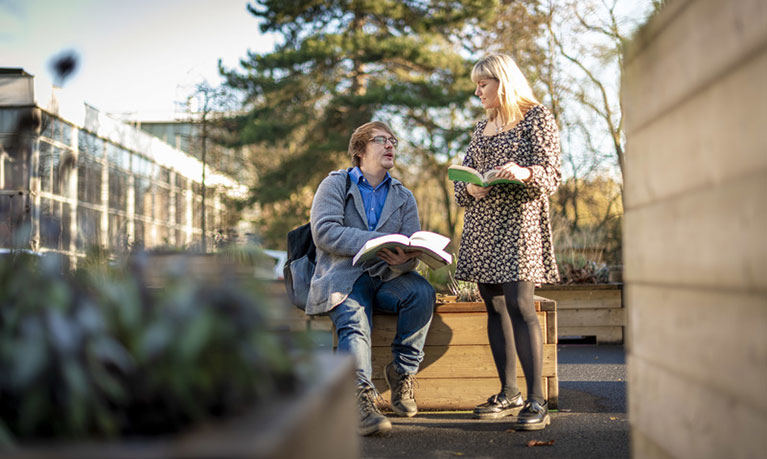
Entry requirements
Typical offer for 2024/25 entry.
Fees and funding
2024/25 tuition fees.
| Student | Full-time | Part-time |
|---|---|---|
| UK, Ireland*, Channel Islands or Isle of Man | 2025/26 fees TBC 2024/25 fees - £9,250 per year |
Request fee information |
| EU | 2025/26 fees TBC 2024/25 fees - £9,250 per year with EU Support Bursary** 2025/26 fees TBC 2024/25 fees - £16,800 per year without EU Support Bursary** |
Not available |
| International | 2025/26 fees TBC 2024/25 fees - £16,800 per year |
Not available |
If you choose to do a work placement2, you should consider travel and living costs to cover this. There is also a tuition fee3 of £1,250 that will cover your academic support throughout your placement year.
For advice and guidance on tuition fees and student loans visit our Undergraduate Finance page and see The University’s Tuition Fee and Refund Terms and Conditions.
We offer a range of International scholarships to students all over the world. For more information, visit our International Scholarships page.
Tuition fees cover the cost of your teaching, assessments, facilities and support services. There may be additional costs not covered by this fee such as accommodation and living costs, recommended reading books, stationery, printing and re-assessments should you need them. Find out what's included in your tuition costs.
The following are additional costs not included in the tuition fees:
- Any optional overseas field trips or visits: £400+ per trip.
- Any costs associated with securing, attending or completing a placement (whether in the UK or abroad).
*Irish student fees
The rights of Irish residents to study in the UK are preserved under the Common Travel Area arrangement. If you are an Irish student and meet the residency criteria, you can study in England, pay the same level of tuition fees as English students and utilise the Tuition Fee Loan.
**EU Support Bursary
Following the UK's exit from the European Union, we are offering financial support to all eligible EU students who wish to study an undergraduate or a postgraduate degree with us full-time. This bursary will be used to offset the cost of your tuition fees to bring them in line with that of UK students. Students studying a degree with a foundation year with us are not eligible for the bursary.
Facilities
Students will benefit from studying on our well-equipped, modern campus4.

Building Redevelopment
We are currently in the process of a major redevelopment of our Faculty of Arts and Humanities buildings. Set to open in 2023, the building will be open to the public, as well as students, and will feature an expansive gallery space.
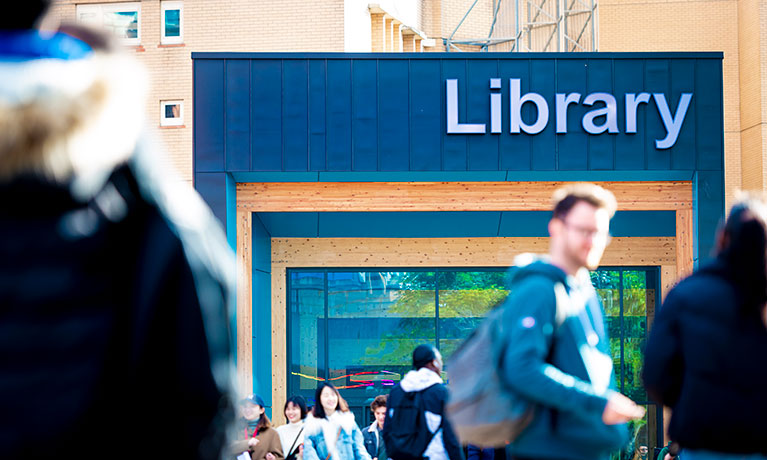
The Library
You will benefit from our support designed to help you succeed and our industry-relevant teaching and resources. These include our modern library and computing facilities, dedicated careers advice and Students’ Union.
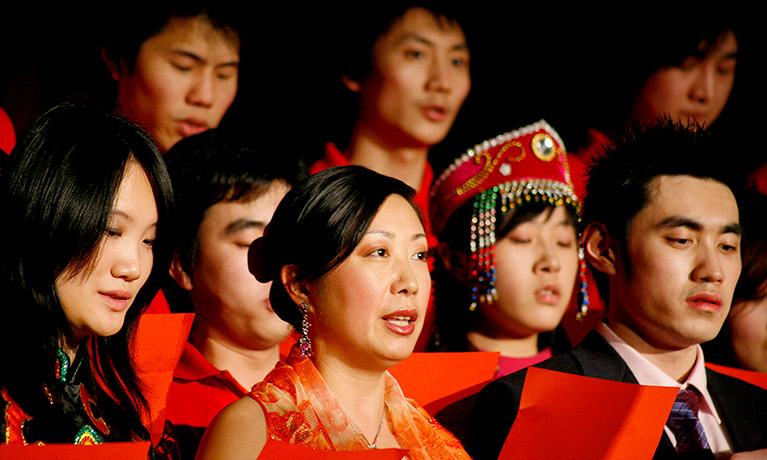
Confucius Institute
The School of Humanities is home to the Confucius Institute. This is a collaboration created through a partnership with Jiangxi University of Finance and Economics, which aims to promote an understanding of the Chinese language and culture.
Careers and opportunities
On successful completion of the course, you will be able to demonstrate:
- The ability to generate and develop original creative work.
- An advanced range of editorial skills.
- Advanced critical knowledge and understanding of literary works and genres from selected periods.
- The ability to critically analyse works of fiction and non-fiction, interrogate and evaluate the arguments and theories of others and to formulate and construct critical arguments of one’s own.
- The ability to utilise digital tools and technologies to practise original subject-based research and demonstrate the ability to be active, engaged participants in the era of online communication.
- A broad understanding of the history, evolution, spread, and nature of the English language. This includes how the English language can vary and change according to context, identity and social interaction.
- Knowledge and skills acquired on the course are necessary for a range of postgraduate study and/or employment opportunities and personal aspirations.
Embedded employability will be delivered through an optional placement year2, alongside skills and core competency development for all students throughout the course.
You will even have the opportunity to have your radio dramas potentially broadcast by the BBC and to produce the CovWords Creative Writing magazine (online and printed)2. You can engage in submitting work for publication and enter competitions. CovWords exists in multiple formats: as a print version, as a YouTube site for digital performance and as a website which includes conventional and multimodal texts such as poems, stories, digital picture books and radio dramas.
Where our graduates work
Recent graduates of the course have gone on to work in teaching or publishing for companies such as Granta Magazine.
As the course also develops other abilities, such as thinking critically and analytically, research, collating and organising data, a number of previous students have also embarked upon careers as financial specialists, HR managers or press officers in companies such as Air Products, Tesco and Deutsche Bank.
Further study
You can choose to continue your studies at Coventry University with the English Literature MA. You may be entitled to an alumni discount on your fees if you decide to extend your time with us by progressing from undergraduate to postgraduate study.
Graduate Immigration Route visa
Based on current information from the UK Government, international students whose study extends beyond summer 2021 may be eligible for a visa under the UK Government’s Graduate Immigration Route, which will enable students to stay and work, or look for work, in the UK at any skill level for up to two (2) years. Check the most up to date guidance available to check your eligibility and any updates from the UK Government before making an application or enrolment decision.
How to apply
You may also like

English Literature BA (Hons)
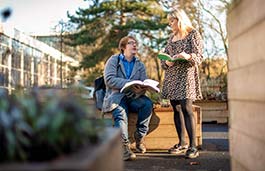
English Language and Literature BA (Hons)
